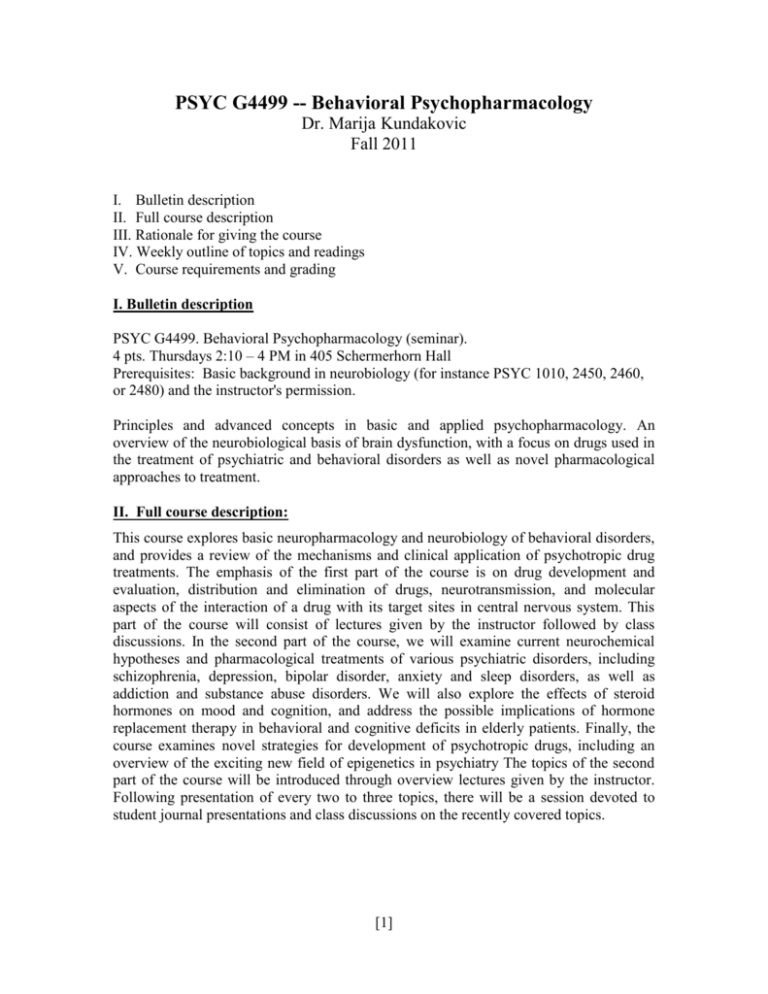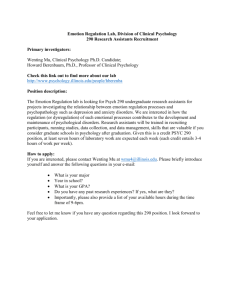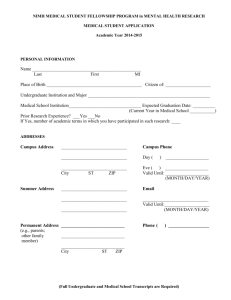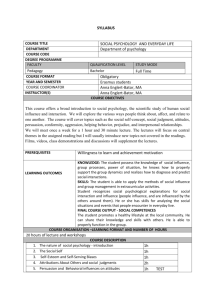Behavioral Psychopharmacology – course proposal
advertisement

PSYC G4499 -- Behavioral Psychopharmacology Dr. Marija Kundakovic Fall 2011 I. Bulletin description II. Full course description III. Rationale for giving the course IV. Weekly outline of topics and readings V. Course requirements and grading I. Bulletin description PSYC G4499. Behavioral Psychopharmacology (seminar). 4 pts. Thursdays 2:10 – 4 PM in 405 Schermerhorn Hall Prerequisites: Basic background in neurobiology (for instance PSYC 1010, 2450, 2460, or 2480) and the instructor's permission. Principles and advanced concepts in basic and applied psychopharmacology. An overview of the neurobiological basis of brain dysfunction, with a focus on drugs used in the treatment of psychiatric and behavioral disorders as well as novel pharmacological approaches to treatment. II. Full course description: This course explores basic neuropharmacology and neurobiology of behavioral disorders, and provides a review of the mechanisms and clinical application of psychotropic drug treatments. The emphasis of the first part of the course is on drug development and evaluation, distribution and elimination of drugs, neurotransmission, and molecular aspects of the interaction of a drug with its target sites in central nervous system. This part of the course will consist of lectures given by the instructor followed by class discussions. In the second part of the course, we will examine current neurochemical hypotheses and pharmacological treatments of various psychiatric disorders, including schizophrenia, depression, bipolar disorder, anxiety and sleep disorders, as well as addiction and substance abuse disorders. We will also explore the effects of steroid hormones on mood and cognition, and address the possible implications of hormone replacement therapy in behavioral and cognitive deficits in elderly patients. Finally, the course examines novel strategies for development of psychotropic drugs, including an overview of the exciting new field of epigenetics in psychiatry The topics of the second part of the course will be introduced through overview lectures given by the instructor. Following presentation of every two to three topics, there will be a session devoted to student journal presentations and class discussions on the recently covered topics. [1] III. Rationale for giving the course: This course is designed to familiarize the students with basic and more advanced concepts of psychopharmacology, and will explore both basic science and applied clinical research in this field. The first part of the course will cover general principles of neuropharmacology, neurotransmission and research methods in behavioral neuroscience, and will prepare students for the sections of the course involving the study of neurobiology and treatments of specific mental and behavioral disorders. Besides exploring drugs that are currently used in psychiatric clinical practice, the course will also emphasize novel strategies for development of psychopharmacological treatments. While the main goal of the course is to provide overview of all relevant topics in psychopharmacology, the students will be urged to further explore their specific area of interest by choosing a topic and type of article for presentation and essay writing. Student presentations and discussions will be aimed to foster critical evaluation of primary research literature, while students will also be required to write a term paper in the form of a review article, for which they will be asked to summarize the current state of knowledge and research on a particular topic. Overall, this course is designed to provide a foundation for advanced study in behavioral neuroscience, neuropsychopharmacology, and related research areas, as well as to provide an introduction to the pharmacological treatment of mental disorders for students interested in clinical psychology and psychiatry. The Psychology Program Goals that will be advanced in this seminar (see http://www.columbia.edu/cu/psychology/dept/ugrad/goals.html) include 1. Knowledge base; 2. Research methods; 4. Critical thinking; 5. Values in psychology; 6. Application of psychology; 7. Communication skills—written; 8. Communication skills—oral; 9. Information and technological literacy. PSYC G4499 is an advanced seminar, designed particularly for graduate students, for advanced undergraduates who are majoring in Psychology or in Neuroscience and Behavior, and for students participating in the Psychology Postbac Certificate Program. These students will have priority in registration, followed by junior majors followed by non-majors. The seminar will be well suited to students who have completed two or more lecture courses beyond W1001, such as W1010 (Mind, Brain, and Behavior), W2215 (Cognition and the Brain), W2450 (Behavioral Neuroscience), W2460 (Drugs and Behavior), or W2480 (Developing Brain). It will help ameliorate a serious shortage of advanced seminars giving students opportunities to develop their oral and written presentation skills. It fulfills the following degree requirements: • For Psychology Graduate Students, PSYC G4499 will apply toward the “two seriously graded seminars” requirement of the Master’s degree. [2] • For the Psychology major or concentration in the College and in G. S., for the Psychology minor in Engineering, and for the Psychology Postbac Certificate, G4499 meets the Group II (Psychobiology and Neuroscience) distribution requirement. • For the Neuroscience and Behavior joint major, G4499 will fulfill the 5th Psychology requirement: “one advanced psychology seminar from a list approved by the Psychology Department advisor to the program.” • For non-majors in the College and GS, G4499 – by virtue of its numbering in the 4400's--will count as one term of the natural science requirement, provided that students obtain the necessary permission and have taken the prerequisite psychology courses. Graduate students, and students who are majoring in Psychology or in Neuroscience and Behavior, and postbac certificate students will have priority over students who are taking the course for the science requirement. For this reason, as well as because of the course prerequisites, we anticipate the course will rarely be used for the science requirement. • For the Psychology Postbac certificate, PSYC G4499 will fulfill the advanced seminar requirement. • For the Barnard Psychology major, PSYC G4499 will fulfill the senior seminar requirement. IV. Weekly outline of topics and readings [subject to revision]: Required textbook: Meyer JS and Quenzer LF (2005): Psychopharmacology: Drugs, the brain and behavior. Sinauer Associates, Inc., Sunderland, MA. Week 1 Course introduction -discussion of topics and course requirements Week 2 Basic principles of neuropharmacology -pharmacokinetics and pharmacodynamics; drug discovery and evaluation; animal models, preclinical and clinical drug testing; READINGS: Meyer and Quenzer: Chapter 1 Markou A, Chiamulera C, Geyer MA, Tricklebank M, Steckler T (2009) Removing obstacles in neuroscience drug discovery: the future path for animal models. Neuropsychopharmacology 34:74-89. Nestler EJ, Hyman SE (2010) Animal models of neuropsychiatric disorders. Nat Neurosci. 13:1161-9. Week 3 Chemical signaling in the central nervous system -neurotransmitters, neuropeptides, neurotrophic factors and hormones [3] READINGS: Meyer and Quenzer: Chapters 2-3 Week 4 Molecular targets for psychotropicdrug action -neurotransmitter synthesis, receptors, receptor signaling, transporters, regulation of gene expression; molecular research methods in neuropharmacology. READINGS: Meyer and Quenzer: Chapters 4-7 Week 5 Exam Week 6 Schizophrenia - neurochemical basis and pharmacotherapy READINGS: Meyer and Quenzer: Chapter 18 Ross CA, Margolis RL, Reading SA, Pletnikov M, Coyle JT (2006) Neurobiology of schizophrenia. Neuron. 52:139-53. Gray JA, Roth BL. (2007) The pipeline and future of drug development in schizophrenia. Mol Psychiatry. 12(10):904-22. Week 7 Affective disorders - neurochemical basis and pharmacotherapy READINGS: Meyer and Quenzer: Chapter 16 Krishnan V, Nestler EJ (2008) The molecular neurobiology of depression. Nature 455:894-902. Thase ME, Denko T. (2008) Pharmacotherapy of mood disorders. Annu Rev Clin Psychol. 4:53-91. Week 8 Journal article presentations/review session -4 students will critically evaluate a research article on a selected topic covered in weeks 6-7; every presentation will be followed by class discussion. Week 9 Substance Abuse and Addiction – Part 1 -alcohol, the opiates, marijuana, and cannabinoids READINGS: Meyer and Quenzer: Chapters 8-10 & 13 Week 10 Nestler EJ (2005) Is there a common molecular pathway for addiction? Nat Neurosci. 8(11):1445-9. Substance Abuse and Addiction – Part 2 -psychomotor stimulants, nicotine, caffeine, and hallucinogens [4] READINGS: Meyer and Quenzer: Chapters 11-12 & 14-15 Week 11 Journal article presentations/review session -4 students will critically evaluate a research article on a selected topic covered in weeks 9-10; every presentation will be followed by class discussion. Week 12 Anxiety and sleep disorders - neurochemical basis and pharmacotherapy READINGS: Meyer and Quenzer: Chapter 17 Ravindran LN, Stein MB (2010) The pharmacologic treatment of anxiety disorders: a review of progress. J Clin Psychiatry. 71:839-54. Christmas D, Hood S, Nutt D (2008) Potential novel anxiolytic drugs. Curr Pharm Des. 14:3534-46. Week 13 Sex hormones and brain function: Implication of hormone replacement therapy for the aging female and male brain READINGS: Sherwin BB. (2003) Estrogen and cognitive functioning in women. Endocr Rev. 24(2):133-51. Steiner M, Dunn E, Born L. (2003) Hormones and mood: from menarche to menopause and beyond. J Affect Disord. 74(1):67-83. Deecher D, Andree TH, Sloan D, Schechter LE. (2008) From menarche to menopause: exploring the underlying biology of depression in women experiencing hormonal changes. Psychoneuroendocrinology. 33(1):3-17. Maia H Jr, Casoy J, Valente J. (2009) Testosterone replacement therapy in the climacteric: benefits beyond sexuality. Gynecol Endocrinol. 25(1):1220. Zitzmann M. (2006) Testosterone and the brain. Aging Male. 9(4):195-9. Hijazi RA, Cunningham GR. (2005) Andropause: is androgen replacement therapy indicated for the aging male? Annu Rev Med. 56:117-37. Week 14 A future for epigenetic drugs in the pharmacotherapy of psychiatric disorders READINGS: Tsankova N, Renthal W, Kumar A, Nestler EJ. (2007) Epigenetic regulation in psychiatric disorders. Nat Rev Neurosci. 8(5):355-67. [5] Grayson DR, Kundakovic M, Sharma RP. (2010) Is there a future for histone deacetylase inhibitors in the pharmacotherapy of psychiatric disorders? Mol Pharmacol. 77(2):126-35. Week 15 Journal article presentations/review session -4 students will critically evaluate a research article on a selected topic covered in weeks 13-15; every presentation will be followed by class discussion. V. Course requirements and grading [subject to revision]: Exam (to be given in Week 5): A multiple-choice test will be given following the general part of the course (the first 4 sessions). This test will be designed to assess students’ understanding of basic concepts of neuropharmacology presented in the class, and to ensure that students will be able to follow more specific topics covered in the second part of the course. Oral Presentation and Essay: Students will be expected to give a presentation and write a paper on a single subject chosen from a list of topics covered in the class. Three separate sessions will be devoted to the student presentations (4 presentations/session), in which each student will be given 20 minutes to present followed by 5-10 min for questions and discussion. Presentations should focus on one to two recently published basic or clinical research articles in student’s area of interest, and should include: introduction to the research area, discussion of methods, results and conclusions of each paper, as well as future directions. Students not presenting will be expected to read the papers before coming to the class and to participate in discussions following presentations. Throughout the course, students will also be expected to participate in class discussions that will follow the overview lectures given by the instructor. The 10-page term paper will be due at the end of the course, and should be written in the style of a review article that summarizes the current state of knowledge and research in the student's area of interest. Course grades will be based on: multiple-choice exam (20%), class attendance and participation (25%), oral presentation (25%), and the term paper (30%). [6]






